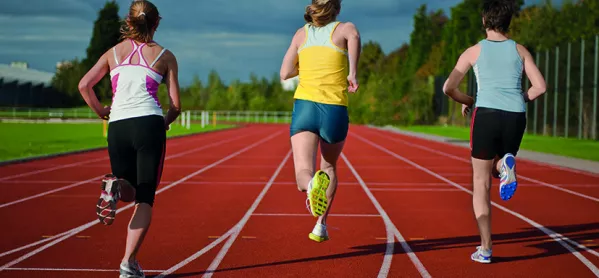Walk into a newsagent, pick up a random running magazine and have a quick flick through it. You will be assailed with advice on improving your speed, going the distance and avoiding injury - all of it based on the latest scientific research. But when you look more closely at the research, you will see that they are talking about shaving a second each mile from your marathon time or exercises that worked with elite athletes under expert supervision. These are marginal gains that make all the difference to the professionals but may do very little for the average weekend warrior.
But when it comes to education, we are the professionals. We are the elite and the experts who can benefit from this level of fine tuning. Once we have got the basics right, we can look for those small tweaks to our practice that might not seem like much on their own, but as a combination could make a huge difference to the children we teach.
Here are a few lessons we could learn from the world of competitive sports.
Cut the fat
One key question that all school leaders should ask is: what is holding us back? One of the simplest ways for amateur runners or cyclists to increase their speed is to slim down. Carrying too much weight just makes it harder to go anywhere efficiently.
So, where is the excess fat that is slowing us down? In my own department, we have been determined to make real improvements to what we teach and how we teach it; but we also realised that we couldn’t work any harder or put in any more hours. We had nothing left to give. The solution was to cut the fat. We looked at marking policies to identify waste, looked at how we analysed data, how we planned lessons, how we ran revision sessions. At every turn, we asked, “Is this the most effective and efficient way?” If it wasn’t, we changed it.
All the gear, no idea
We are becoming increasingly obsessed with data, both in sports and in school. You’d be hard-pressed to find a runner not tracking their steps, pace and heart rate when out for a run. All this data is safely logged away to be poured over and contrasted with previous and future runs. And then… what? What do they do with this data?
I’m not sure that the situation is much different in schools, with their focus on “points of data capture” and “question-level analysis”. Data is put on to spreadsheets, numbers are crunched and then… what? We need to think much more carefully about how we use data in a meaningful way. In her book Making Good Progress?, Daisy Christodoulou points out that there is no point in trying to capture summative assessment more than once, at most twice, a year as learning is too complicated to measure more frequently. We need instead to use simple formative assessments to ascertain whether pupils can do what we think they should be able to do, and then have something in place to close any gaps that this identifies.
Rowing together
When you hear winning teams talking about what they have achieved, time and time again you hear talk of the role of team bonding, of clear communication and a drive towards a common goal. You read the same thing in case studies about successful schools as well, where a shared culture, consistency and clear ambition are common traits.
At my own school, we have taken this approach to making marginal gains. For example, the head of the literacy innovation team introduced the idea of a five-minute read at the start of each period 5 lesson in order to increase how much independent reading students were doing. These are the kind of ideas that you hear people talking about in our timetabled collaboration time, when people share strategies for the small changes that make the big differences.
Focusing on the idea of marginal gains has revolutionised sports teams around the world. And with its focus on doing what you are already doing but better, I think it is a philosophy which has the potential to revolutionise school leadership as well.
The GB men’s eight rowing team in the 2000 Olympics built its shared culture around a very simple quote to focus them on what they should be doing: “Will it make the boat go faster?” I can think of no better message for teachers, departments and schools to adopt as their own.
Mark Enser is head of geography at Heathfield Community College. He blogs at teachreal.wordpress.com
Want to keep up with the latest education news and opinion? Follow Tes on Twitter and like Tes on Facebook




